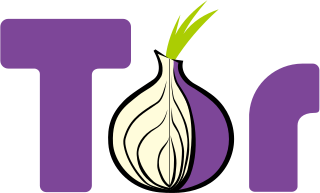
Irssi is an Internet Relay Chat (IRC) client program for Linux, FreeBSD, macOS and Microsoft Windows. It was originally written by Timo Sirainen, and released under the terms of the GNU GPL-2.0-or-later in January 1999.

GNU Privacy Guard is a free-software replacement for Symantec's PGP cryptographic software suite. The software is compliant with RFC 4880, the IETF standards-track specification of OpenPGP. Modern versions of PGP are interoperable with GnuPG and other OpenPGP-compliant systems. GnuPG is however expected, as of April 2024, to break compliance with the upcoming revision of OpenPGP and thus with other implementations that will continue to comply.

Pidgin is a free and open-source multi-platform instant messaging client, based on a library named libpurple that has support for many instant messaging protocols, allowing the user to simultaneously log in to various services from a single application, with a single interface for both popular and obsolete protocols, thus avoiding the hassle of having to deal with new software for each device and protocol.

Werner Koch is a German free software developer. He is best known as the principal author of the GNU Privacy Guard. He was also Head of Office and German Vice-Chancellor of the Free Software Foundation Europe. He is the winner of Award for the Advancement of Free Software in 2015 for founding GnuPG.
In cryptography, Camellia is a symmetric key block cipher with a block size of 128 bits and key sizes of 128, 192 and 256 bits. It was jointly developed by Mitsubishi Electric and NTT of Japan. The cipher has been approved for use by the ISO/IEC, the European Union's NESSIE project and the Japanese CRYPTREC project. The cipher has security levels and processing abilities comparable to the Advanced Encryption Standard.
This is a list of operating systems specifically focused on security. Similar concepts include security-evaluated operating systems that have achieved certification from an auditing organization, and trusted operating systems that provide sufficient support for multilevel security and evidence of correctness to meet a particular set of requirements.
Ian Jackson is a longtime free software author and Debian developer. Jackson wrote dpkg, SAUCE, userv and debbugs. He used to maintain the Linux FAQ. He runs chiark.greenend.org.uk, a Linux system which is home to PuTTY among other things.

Gnash is a media player for playing SWF files. Gnash is available both as a standalone player for desktop computers and embedded devices, as well as a plugin for the browsers still supporting NPAPI. It is part of the GNU Project and is a free and open-source alternative to Adobe Flash Player. It was developed from the gameswf project.

In 2006, a branding issue developed when Mike Connor, representing the Mozilla Corporation, requested that the Debian Project comply with Mozilla standards for use of the Thunderbird trademark when redistributing the Thunderbird software. At issue were modifications not approved by the Mozilla Foundation, when the name for the software remained the same.

Swiftfox was a web browser based on Mozilla Firefox. It was available for Linux platforms and distributed by Jason Halme. Swiftfox was a set of builds of Firefox optimized for different Intel and AMD microprocessors. Swiftfox was freely downloadable with open source code and proprietary binaries. Firefox extensions and plugins were compatible with Swiftfox, with notable exceptions. The name Swiftfox comes from the animal swift fox. Swiftfox differs from Firefox by a limited number of changes, and builds for different processors. Swiftfox was discontinued at some point prior to April 2017, and the project homepage now redirects to the creator's private Twitter account.

GNU IceCat, formerly known as GNU IceWeasel, is a completely free version of the Mozilla Firefox web browser distributed by the GNU Project. It is compatible with Linux, Windows, Android and macOS.
Swiftweasel was a fork of Mozilla Firefox available for the Linux platform only.
IcedTea is a build and integration project for OpenJDK launched by Red Hat in June 2007. IcedTea also includes some addon libraries: IcedTea-Web is a free software implementation of Java Web Start and the Java web browser applet plugin. IcedTea-Sound is a collection of plugins for the Java sound subsystem, including the PulseAudio provider which used to be included with IcedTea. The Free Software Foundation recommends that all Java programmers use IcedTea as their development environment.
In cryptography, Curve25519 is an elliptic curve used in elliptic-curve cryptography (ECC) offering 128 bits of security and designed for use with the Elliptic-curve Diffie–Hellman (ECDH) key agreement scheme. It is one of the fastest curves in ECC, and is not covered by any known patents. The reference implementation is public domain software.
xB Machine is a discontinued virtual operating system that is small enough to fit on a USB drive. The last version seems to have been 0.9.1.5 in mid-2008. It brought a secure computing environment that anonymized all internet activity, and had portable encrypted file storage. It had been developed and offered by XeroBank and based on a modified Gentoo Linux distribution. It could be executed as a virtual machine through a QEMU hypervisor, VMWare, VirtualBox, and any other major virtualization system. It could also be booted from on USB or burned to CD for booting. Virtualization, along with the native implementation of a Tor onion routing for internet connectivity and other encryption and privacy tools, had been utilized to increase the security and anonymity of the user. The developers claimed that it is the most secure operating system in the world and that the technology involved is highly resistant to hacking and spying, even in the most hostile environments. The details and transactions inside each xB Machine account were protected with 256-bit AES encryption. The software also had a self-destruct sequence for eliminating any traces that a user may have left behind on the drivespace after using xB Machine. Meanwhile, Xerobank offers a modular package with xB Browser, xB Mail, and xB VPN, parts of it running only for customers of the bank.

Tor is a free overlay network for enabling anonymous communication. Built on free and open-source software and more than seven thousand volunteer-operated relays worldwide, users can have their Internet traffic routed via a random path through the network.

Tails, or "The Amnesic Incognito Live System", is a security-focused Debian-based Linux distribution aimed at preserving Internet privacy and anonymity. It connects to the Internet exclusively through the anonymity network Tor. The system is designed to be booted as a live DVD or live USB and never writes to the hard drive or SSD, leaving no digital footprint on the machine unless explicitly told to do so. It can also be run as a virtual machine, with some additional security risks.

Whonix is a Linux distribution, based on Kicksecure OS, claimed to be security hardened by its developers. Its main goals are to provide strong privacy and anonymity on the Internet. The operating system consists of two virtual machines, a workstation and a Tor gateway running Debian. All communications are forced through Tor.










